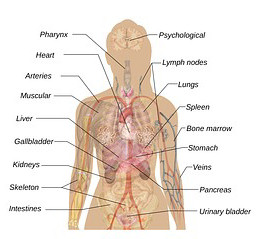Obesity and Kidney Stones Development Are Related, According to Study
Obese women are more prone to developing kidney stones, according to a study authored by Dr. Khurshid Ghani and team. The findings of the study were published in the August 8, 2013 edition of the Journal of Neurology. The team conducted the research for four years culminating in 2009: http://www.nlm.nih.gov/medlineplus/news/fullstory_140162.html
 The research finding from this study is supported by an article published online by diabetesincontrol.com, which said that obesity, being associated with insulin resistance and compensatory hyperinsulinemia, causes metabolic dysfunction. Such metabolic dysfunction may lead to the formation of kidney stones, the article claimed.
The research finding from this study is supported by an article published online by diabetesincontrol.com, which said that obesity, being associated with insulin resistance and compensatory hyperinsulinemia, causes metabolic dysfunction. Such metabolic dysfunction may lead to the formation of kidney stones, the article claimed.
Ghani and his team used emergency hospital visits to track down the number of patients who were diagnosed to be suffering from kidney stones. They had recorded about 3,200,000 patient visits related to upper urinary tract stones over the four years of study. From 289 cases of kidney stones in 2006, the researchers noted an increase of 17 cases per 100,000 hospital visits in their 2009 records.
According to Louis Kraml, it is not clear from the report if all the visits were made by unique individuals or there were no repetition of visits from the same individual. What was clear is that visits from women increased far more greatly than visits from men over the same period, the researchers added. The researchers concluded that the increase in the number of kidney-stone-related hospital visits from women is directly related to the increase of the number of women who are suffering from obesity.
However, the researchers reported that only 12% of those who were diagnosed to be suffering from kidney stone formations were hospitalized. They thought that the number was too small and may fail to reflect the extent of the problem in some patients. They suggested that more advanced technology be used in identifying the levels of severity of kidney stone cases.
Implication of the Study
It is important that medical research be geared towards determining the many other negative consequences of obesity. By identifying these consequences, medical experts will have more reasons to encourage obese patients to really take care of one’s diet and the way you live your life.
